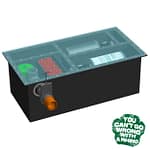How do you filter hydrocarbons from water?
Green Rhino’s pioneering drainage products use smart polymer technology to extract hydrocarbons from water.
Smart polymers are materials that change in response to external stimuli. The smart polymers we use react with hydrocarbons turning them from a liquid to a solid or semi-solid state.
We have developed proprietary blends of smart polymers optimized to work with a range of hydrocarbons.
Contaminants like transformer fluids, fuels, motor oils and even the complex hydrocarbons in wood preservers like Creosote, can be successfully extracted from a flow of water as it drains freely into the environment.
The filtered water contains less than 5ppm of hydrocarbons, the benchmark for complying with pollution prevention regulations.
The smart polymers are contained within the DrainEezy™ Filters inside the Filtration Systems.
Why use DrainEezy™ instead of a traditional oil water separator?
- Reliable filtration not prone to failure
- Minimal maintenance required
- No power requirement
- Quicker, cheaper, safer installation
- Easy to access for inspection and sampling
- Consumable filters can last years on low risk sites
- Dispose of spent filters in standard hazardous waste bins












